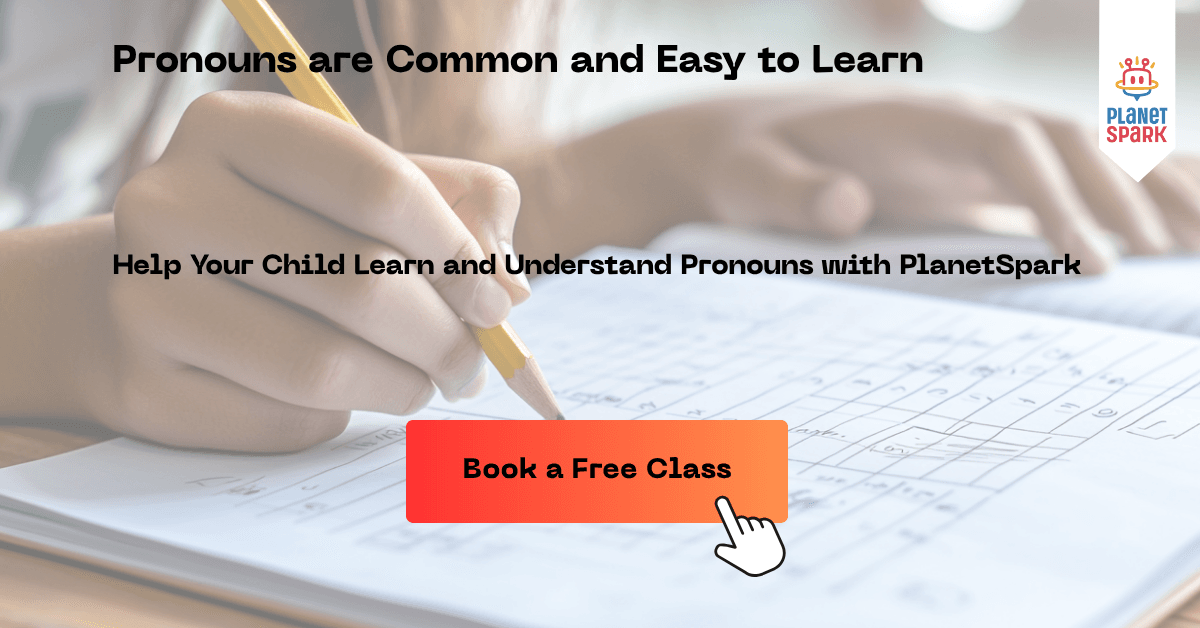Master Pronouns & Grammar with PlanetSpark | Class 5 Guide
Last Updated At: 20 Jul 2025
7 min read

Table of Contents
- What is a Pronoun?
- Why are Pronouns Important in Grammar?
- Types of Pronouns Explained for Class 5 Students
- Rules for Using Pronouns
- Common Mistakes Class 5 Students Make with Pronouns
- Tips to Teach Pronouns Effectively to Class 5 Students
- How PlanetSpark’s English Grammar Course Helps Master Pronou
- Conclusion
- FAQs on Pronouns and PlanetSpark’s Grammar Course
Understanding grammar is essential for young learners, and pronouns are among the foundational concepts that every student in Class 5 must master. This blog will walk you through everything you need to know about pronouns — their types, rules, usage, examples, and how PlanetSpark’s English Grammar Course makes learning them simple, fun, and effective.
What is a Pronoun?
A pronoun is a word used to replace a noun in a sentence to avoid repetition and make sentences clearer. For example:
- Ria loves to read. She spends hours at the library. Here, ‘she’ replaces ‘Ria’.
Why are Pronouns Important in Grammar?
Pronouns make our speech and writing smoother and less repetitive. They also help establish better sentence structure and enable learners to express themselves clearly. In Class 5, understanding pronouns equips students with the tools to build grammatically correct and fluid sentences.
Want your child to build strong English skills? Try a free session of PlanetSpark’s English Grammar Course today!
Types of Pronouns Explained for Class 5 Students
There are 8 major types of pronouns that students in Class 5 should learn:
1. Personal Pronouns
These refer to specific people or things and change form depending on their position in the sentence.
Examples:
- I, me, we, us, you, he, him, she, her, it, they, them
Examples in sentences:
- I am going to school.
- They are playing football.
Subject Pronouns: I, we, you, he, she, it, they Object Pronouns: me, us, you, him, her, it, them
Boost your child’s grammar confidence with live grammar classes at PlanetSpark!
2. Possessive Pronouns
These show ownership or belonging.
Examples: mine, yours, his, hers, its, ours, theirs
Examples in sentences:
- This book is mine.
- Is this pencil yours?
Book a free PlanetSpark demo and see how we make possessive pronouns easy to learn!
3. Reflexive Pronouns
These are used when the subject and the object of a sentence are the same.
Examples: myself, yourself, himself, herself, itself, ourselves, yourselves, themselves
Examples in sentences:
- I taught myself to draw.
- They prepared the meal themselves.
4. Demonstrative Pronouns
Used to point to specific things.
Examples: this, that, these, those
Examples in sentences:
- This is my favorite movie.
- Those are my shoes.
Make confusing topics like demonstrative and relative pronouns simple with PlanetSpark’s 1:1 sessions. Book your free trial now!
5. Interrogative Pronouns
These are used to ask questions.
Examples: who, whom, whose, which, what
Examples in sentences:
- Who is your best friend?
- What are you doing?
6. Relative Pronouns
These connect a clause or phrase to a noun or pronoun.
Examples: who, whom, whose, which, that
Examples in sentences:
- The girl who won the prize is my friend.
- I like the book that you gave me.
7. Indefinite Pronouns
These refer to non-specific people or things.
Examples: someone, anyone, everyone, nobody, anything, nothing, each, few, many
Examples in sentences:
- Everyone enjoyed the show.
- Nothing is impossible.
8. Reciprocal Pronouns
These express a mutual action or relationship.
Examples: each other, one another
Examples in sentences:
- The two friends helped each other.
- We should respect one another.

Rules for Using Pronouns
- Pronouns must agree with the noun in number (singular/plural).
- Incorrect: Everyone must bring their pencil.
Correct: Everyone must bring his or her pencil.
- Incorrect: Everyone must bring their pencil.
- Use the right case: subject vs object.
- He gave the gift to me. (Not “I”)
- Don’t be vague with pronouns.
- Ambiguous: When Jack met Mike, he was happy. (Who is ‘he’?)
- Reflexive pronouns should be used only when the subject and object are the same.
- Indefinite pronouns are often singular (e.g., everyone, someone).
Join PlanetSpark’s grammar program and help your child master grammar rules through guided practice.
Common Mistakes Class 5 Students Make with Pronouns
- Mixing up subject and object pronouns (e.g., "Me went to the market")
- Overusing names instead of using pronouns
- Confusing reflexive and personal pronouns
- Using incorrect possessive forms (e.g., "This is her’s" instead of "hers")
PlanetSpark’s Grammar Program helps overcome these challenges through regular practice, real-time corrections, and gamified activities that reinforce correct usage.
Sign up for a free session and see how your child improves within just a week!
Tips to Teach Pronouns Effectively to Class 5 Students
- Use stories – Ask children to replace nouns with pronouns as they narrate stories.
- Flashcards – Create colorful flashcards with pronouns for memory games.
- Worksheets – Provide fill-in-the-blank exercises.
- Online grammar games – Make learning fun and digital.
- Peer conversations – Encourage students to talk in pairs and spot pronouns in conversations.

How PlanetSpark’s English Grammar Course Helps Master Pronouns
PlanetSpark’s curriculum is thoughtfully designed to ensure Class 5 students understand grammar concepts like pronouns through personalized, live, 1:1 classes.
Key Features:
- Interactive Learning: Animated explanations, storytelling, and activities
- Live Practice: Real-time feedback on sentence formation and speaking exercises
- Gamified Quizzes: Reinforce every pronoun type with digital rewards
- Level-Based Progression: From beginner to advanced learners
- Parent Dashboards: Monitor progress, areas of improvement, and class recaps
- Homework + Worksheets: To extend learning beyond class hours
- Certified Grammar Experts: Trained educators who specialize in working with children aged 7–14
Additional Benefits:
- Weekly assessments and performance reports
- Special grammar events and contests
- Certificates of achievement to motivate learners
Try PlanetSpark’s English Grammar Course today and watch your child become a grammar champ!
Conclusion
Mastering pronouns is an essential part of a student's grammar journey, especially in Class 5 when foundational English skills are being solidified. With a clear understanding of the types, rules, and examples of pronouns, students can enhance their sentence construction, eliminate repetition, and write or speak more fluently. PlanetSpark’s English Grammar Course ensures your child not only learns these concepts in a fun and interactive way but also gains the confidence to apply them in everyday communication.
If you're a parent looking to boost your child’s grammar skills, enroll them in PlanetSpark’s English Grammar Course today and unlock their true potential in English!
FAQs on Pronouns and PlanetSpark’s Grammar Course
1. Why are pronouns important for Class 5 students?
Pronouns simplify communication by replacing nouns and preventing redundancy. Learning them early helps students write clearly and develop better sentence structure. PlanetSpark ensures these concepts are taught through engaging examples and activities.
2. How can I help my child understand the different types of pronouns?
Use real-life examples and simple sentences. PlanetSpark uses interactive activities, animations, and quizzes to teach each type of pronoun in a fun and memorable way.
3. What’s the best age to start learning grammar like pronouns?
Ages 8–11 are ideal as children are more receptive and able to grasp abstract concepts. PlanetSpark’s curriculum is specially designed for this age group, ensuring age-appropriate delivery and retention.
4. Are there any tools or activities for practicing pronouns at home?
Yes! Worksheets, flashcards, sentence-building games, and storytelling are great options. PlanetSpark also offers homework and revision activities to reinforce learning.
5. How does PlanetSpark’s English Grammar Course differ from school classes?
Unlike large classroom setups, PlanetSpark offers 1:1 personalized grammar coaching, tailored lesson plans, regular assessments, and real-time doubt solving for every student.
6. Can students interact and practice in live classes?
Absolutely. Our live 1:1 sessions offer speaking practice, sentence formation activities, and grammar games that make learning engaging and interactive.
7. How long is PlanetSpark’s English Grammar Course and how can I enroll?
Course durations are flexible, with options ranging from a few weeks to a full academic year. To get started, join a free trial class today and experience the PlanetSpark advantage!
Personalized Communication Report
Record a video to get a AI generated personalized communication report for your child
Select Learner's Class

Hi There, want to try these
tips for your child with
LIVE with our expert coach?
Let's check your child's
English fluency
